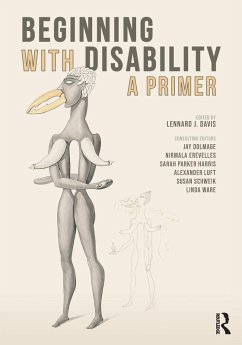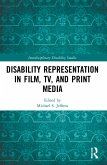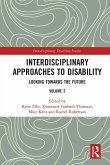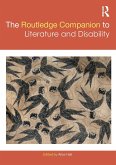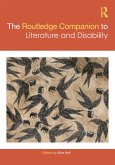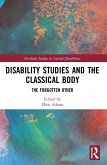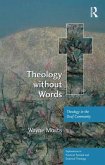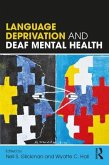While there are many introductions to disability and disability studies, most presume an advanced academic knowledge of a range of subjects. Beginning with Disability is the first introductory primer for disaibility studies aimed at first year students in two- and four-year colleges. This volume of essays across disciplines-including education, sociology, communications, psychology, social sciences, and humanities-features accessible, readable, and relatively short chapters that do not require specialized knowledge.
Lennard Davis, along with a team of consulting editors, has compiled a number of blogs, vlogs, and other videos to make the materials more relatable and vivid to students. "Subject to Debate" boxes spotlight short pro and con pieces on controversial subjects that can be debated in class or act as prompts for assignments.
Lennard Davis, along with a team of consulting editors, has compiled a number of blogs, vlogs, and other videos to make the materials more relatable and vivid to students. "Subject to Debate" boxes spotlight short pro and con pieces on controversial subjects that can be debated in class or act as prompts for assignments.
Beginning with Disability: A Primer brings together a collection of renowned and emergent scholars to offer an exciting and accessible introduction to the interdisciplinary field of disability studies. An excellent resource for those new to this field.
Dan Goodley, Professor of Disability Studies and Education, University of Sheffield
Davis has deftly curated an indispensable introduction to the field of disability studies. With its accessible and engaging prose, Beginning with Disability: A Primer is the disability studies 101 text that will be required reading for every introductory course in the field.
Beth A. Ferri, Professor of Inclusive Education and Disability Studies, Syracuse University
Beginning with Disability gathers established and emerging disability studies scholars and disability activists to reflect on what it means to center disability in analyses of history, culture, politics, and lived experience. The result is a powerfully diverse array of methods, archives and voices, and a series of thought-provoking questions that will be an asset to college instructors and students of disability studies at all levels.
Julie Passanante Elman, Assistant Professor of Women's and Gender Studies, University of Missouri and author of Chronic Youth: Disability, Sexuality, and U.S. Media Cultures of Rehabilitation
Beginning with Disability is an indispensable resource for scholars and students of disability studies. For students new to the field, it offers a clear and accessible introduction to the major interventions and ongoing debates in the field; for more seasoned scholars, it compiles classic texts in one location for convenient reference.
Julie Avril Minich, Assistant Professor of English and Mexican American and Latina/o Studies, University of Texas at Austin
With zest, Beginning with Disability shows us the social relations that make disability a complex set of meanings, experiences, and ways of knowing that should no longer be taken-for-granted. The various works collected here together with the compelling use of examples from popular culture promise to makes this Primer a great one-enabling us to encounter the significance of the mystery that disability is all around us, but as Davis says, "it's often hiding in plain sight."
Tanya Titchkosky, Professor of Disability Studies, Ontario Institute for Studies in Education, University of Toronto and Author of Disability, Self and Society, Reading and Writing Disability Differently, and The Question of Access: Disability, Space, Meaning
Dan Goodley, Professor of Disability Studies and Education, University of Sheffield
Davis has deftly curated an indispensable introduction to the field of disability studies. With its accessible and engaging prose, Beginning with Disability: A Primer is the disability studies 101 text that will be required reading for every introductory course in the field.
Beth A. Ferri, Professor of Inclusive Education and Disability Studies, Syracuse University
Beginning with Disability gathers established and emerging disability studies scholars and disability activists to reflect on what it means to center disability in analyses of history, culture, politics, and lived experience. The result is a powerfully diverse array of methods, archives and voices, and a series of thought-provoking questions that will be an asset to college instructors and students of disability studies at all levels.
Julie Passanante Elman, Assistant Professor of Women's and Gender Studies, University of Missouri and author of Chronic Youth: Disability, Sexuality, and U.S. Media Cultures of Rehabilitation
Beginning with Disability is an indispensable resource for scholars and students of disability studies. For students new to the field, it offers a clear and accessible introduction to the major interventions and ongoing debates in the field; for more seasoned scholars, it compiles classic texts in one location for convenient reference.
Julie Avril Minich, Assistant Professor of English and Mexican American and Latina/o Studies, University of Texas at Austin
With zest, Beginning with Disability shows us the social relations that make disability a complex set of meanings, experiences, and ways of knowing that should no longer be taken-for-granted. The various works collected here together with the compelling use of examples from popular culture promise to makes this Primer a great one-enabling us to encounter the significance of the mystery that disability is all around us, but as Davis says, "it's often hiding in plain sight."
Tanya Titchkosky, Professor of Disability Studies, Ontario Institute for Studies in Education, University of Toronto and Author of Disability, Self and Society, Reading and Writing Disability Differently, and The Question of Access: Disability, Space, Meaning

